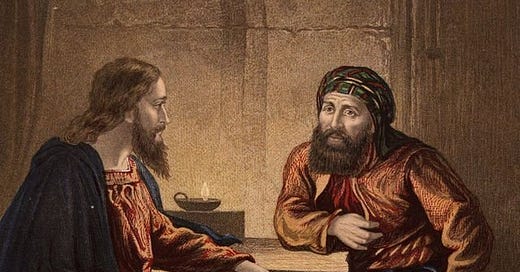Lessons 1-3 from the Divine Office of Pentecost Monday ( Whit Monday) John 3:16-21; Treatise 12 on the Gospel of John by St. Augustine the Bishop.
Lessons 1-3 from the Divine Office of Pentecost Monday ( Whit Monday) John 3:16-21; Treatise 12 on the Gospel of John by St. Augustine the Bishop.
.
At that time, Jesus said to Nicodemus: God so loved the world that He gave His only-begotten Son, that those who believe in Him may not perish, but may have life everlasting. For God did not send His Son into the world in order to judge the world, but that the world might be save through Him. He who believes in Him is not judged; but he who does not believe in Him is already judged, because he does not believe in the Name of the only-begotten Son of God. Now this is the judgment: The light has come into the world, yet men have loved the darkness rather than the light, for their works were evil. For everyone who does evil hates the light, and does not come to the light, that his deeds may not be exposed. But he who does the truth comes to the light that his deeds may be made manifest, for they have been performed in God.
---------------------------------------------
The Physician cometh to do all He can towards the healing of the sick. And the sick person who will not attend to the advice of the Physician bringeth on his own death. This Physician is come, as a Saviour, to the world. Why is He called the Saviour of the world, except that He came, not to condemn the world, but that the world through Him might be saved? Hast thou no desire to be saved through Him? by thine act be thou condemned. Any why do I say, Be thou condemned? Because it is written: He that believeth on Him is not condemned. What then dost thou expect will be said to him that believeth not? This shall be said: He is condemned. Indeed He hath already said more than that, to wit: He that believeth not is condemned already. Though the condemnation be not yet openly pronounced, it hath nonetheless already taken place.
The Lord knoweth them that are His. He knoweth them that will continue unto the crown, and likewise He knoweth them that will continue unto the fire. He knoweth the wheat on His threshing floor, and the chaff. He knoweth the field (which is the world) with its good grain, and its tares. He that believeth not is condemned already. Why? Because he hath not believed in the Name of the only-begotten Son of God. And this is the condemnation: That light is come into the world, and men loved darkness rather than light, because their deeds were evil. Whose deeds, my brethren, doth the Lord find to be good? None. He findeth the works of all men to be in themselves bad. How then do we hear that some there be who do the truth, and come to the light? For it is written: He that doeth truth, cometh to the light.
But He saith: Men loved darkness rather than light. And here He maketh the great point of difference between such as love darkness, and such as come to the light. There be many who have loved their sins. Also there be many who have confessed their sins. He that confesseth, thereby denounceth his sin, and is working already with God. God denounceth thy sins, and if thou denounce them likewise, then dost thou join thyself with God in His act. The man and the sinner are, as it were, two different things. God made the man; man made the sinner. Destroy what thou hast worked in thyself, and God will save what He hath already made. Thou art behoven to hate in thyself thine own works, and to love God's work. When thine own works begin to displease thee, then is it that thou beginnest to do well, because thou denouncest thine own evil works. The first thing to do, if thou wouldest do good works, is to acknowledge thine evil ones.



